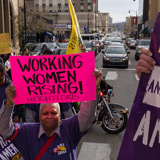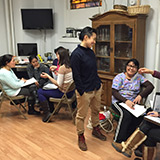
Labor Needs New Ideas
Labor needs to argue more. Unions always need solidarity, but it should not be the solidarity of the stolid and defeated.


Labor needs to argue more. Unions always need solidarity, but it should not be the solidarity of the stolid and defeated.

“You feel free—you feel this is your business,” says trafficking survivor Judith Daluz of the cleaning cooperative where she is now a worker-owner.

Bernie Sanders’s climate plan offers a welcome alternative to the vagueness of the Paris Agreement. But to win over a broader public, a leftist climate agenda will require a vision of a “just transition” that goes beyond our energy system.

The left must move beyond the false binaries of liberal Zionism and embrace a post-Zionist politics of civil rights and nonviolent resistance.
With a counter-argument by Susie Linfield.

The spirit of left Zionism, which was strong enough to build a country, has receded to the margins of Israeli politics. Can it be revived?
With a counter-argument by Joshua Leifer.

An interview with historian Vanessa Ogle about her new book The Global Transformation of Time.


Defending civil liberties is not merely a “strategy” or a means to some other end. One can, and should, oppose both torture and endless war.
In response to Samuel Moyn.


Civil libertarians have tolerated the normalization of perpetual, if more sanitary, war.
With a response by David Cole.

The Trump phenomenon is best understood as an amalgam of three different, largely pathological strains in American history and culture.

A celebration of pioneering union activist and radical troubadour Joe Hill.

The True Cost vividly documents the labor and environmental cost of our cheap clothes. The challenge it poses is direct: how can we stop this? But a deeper question remains: which “we”?

Anarchists are better dreamers than doers. A successful movement requires compromise, organization, and leadership to actually get things done.

Many popular movements around the world today oppose hierarchy and embrace direct democracy. This is a spirit that we should applaud and help to flourish.

Minneapolis protesters’ call to #ReleasetheTapes exemplifies the movement’s strategic use of symbolic demands to win in the court of public opinion.

As Alaska warms and glaciers melt, state leaders continue to ignore the role of fossil fuels in climate change and press for additional oil development.